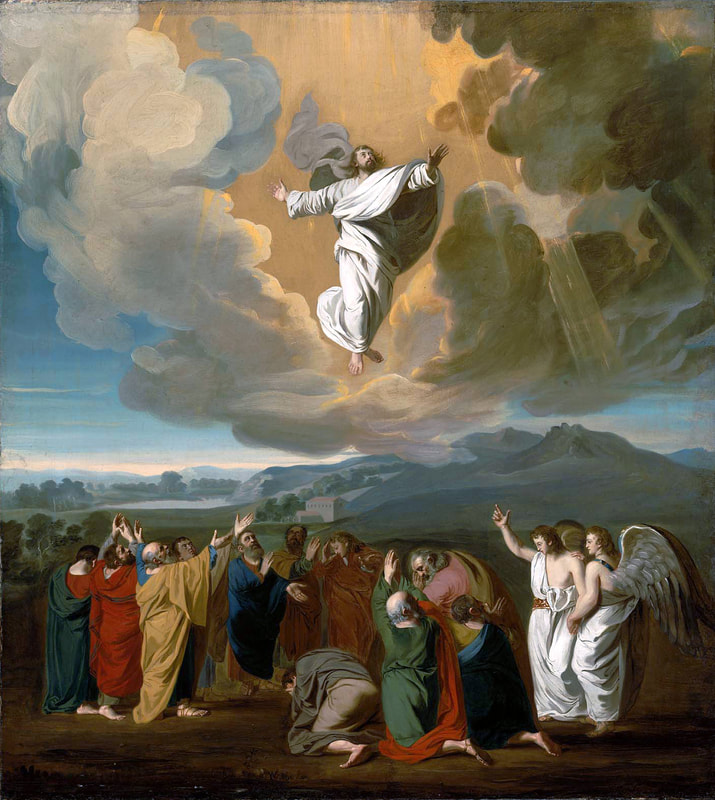|
In the time between his resurrection and his ascension into the heavens, Jesus makes several statements about how he has come and how is going, and about how the Holy Spirit will come after him. It raises a question about how God “comes and goes” at all, given His omnipresence. We can perhaps overlook this question with regard to Jesus, as Jesus is also human and humans come and go all the time. It makes sense for Jesus. But Jesus uses this “coming and going” language with regard to the Father and the Spirit as well. So how can this be? When we try to contemplate God, who He is, what He is like, how He interacts with Creation, and so on, it’s very easy to imagine the god of the philosophers. The Supreme Being, the Absolute, the Prime Mover, the Source. This Absolute is omnipresent, not only present everywhere but constantly interacting with all things and engaged in everything that is by His very nature. There is no room in this God for “coming and going” for this God already is everywhere. The very notion of “coming and going” makes no sense. This is where Jesus challenges us. He tells us that when we look upon him, we see the Father. Jesus reveals the hidden God to us. This isn’t just to challenge and overturn our misguided notions of God as like any of the pagan gods, but also to overturn our highest intellectual attempts at conceptualizing God (namely, the Absolute). If we approach from our human perspective, the God Christ speaks of is incompatible with the Absolute. But he forces us to rethink our perspective. Jesus speaks of God coming and going, and therefore those are things which are proper to God. “The God so conceived [the Absolute] would be pure, sublime, worthy of adoration; but it would destroy the reality given us by Christ’s personal revelation. His Father is precisely that God who ‘comes’ and ‘goes,’ ‘speaks’ and ‘acts.’ Certainly, God is omnipresent, exalted over time and space; yet he also can come when it pleases him; can live among us, and when the hour has struck, can depart and return—with a new countenance.” -Romano Guardini ("The Lord") We see this throughout Scripture, not only in the life of Jesus (though it perhaps becomes more clear to us when we view the totality of Scripture through the lens of Christ). God, though omnipresent, chooses specific moments in history to act: the covenant with Abraham, the burning bush with Moses, the hanging of the sun in the sky with Joshua, the Incarnation of the Son, and so on. There are also times when He seems absent, such as during the Babylonian Exile. This God most certainly comes at times when it pleases Him to do so, and departs the same. Our minds falter at the attempt to understand a God such as this, and yet this is the God which has revealed Himself to us. He is supreme mystery, always to be contemplated yet never able to be comprehended. Thus our intellect must give way to love—specifically, love of Christ, who is the only person capable of penetrating that divine mystery. “In communion with Christ’s heart, our own is suddenly able to experience that of which it is incapable alone. Our spirit stretches to measure up to Christ’s, and thereby grasps much that it never could have grasped by itself. He who believes in Christ thinks through him, feels the mysterious God who reveals himself in Revelation, the God of mystery and yet so familiar, so divinely superior both to ‘the gods’ and the ‘Supreme Being’ of human conception.” -Romano Guardini ("The Lord") Love Christ so that we can love his Father, for the Father lies in inaccessibility and our only access to Him is through the Son. And Christ’s Father is just that: a father. Not merely the Absolute. You cannot love the Absolute. You cannot pray to the Absolute for this or that thing. But you can do so with a father. A father lowers his ear to hear the words and desires of his children, he stoops down to meet them, and he rises again to leave them when he feels it is necessary. He is always there, always ready and able to care for the child. But he also comes and goes as he pleases.
It’s this loving Father that is revealed through Christ. Though incomprehensible to human intellect, the heart is able to bridge the gap which the mind cannot. The heart is able to unite us to Christ, the Son, who reveals the Father to us and leads us to Him. And the Spirit, the Advocate whom the Son sends, stirs within us that capacity to love more fully, constantly working within our hearts and minds to help us to know and love the Father from which He proceeds more perfectly.
0 Comments
Leave a Reply. |
Series Info
Every day of Lent, I am writing a reflection piece on two chapters of "The Lord" by Romano Guardini. If you'd like to read or follow along, you can find the full calendar of where we're at below, or Click Here for the main landing page. Archives
April 2020
Categories
All
|

 RSS Feed
RSS Feed